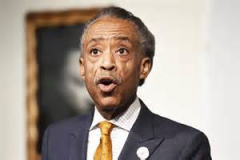 Rev. Al Sharpton
Rev. Al Sharpton
President, National Action Network
On Saturday, Dec. 13, thousands will join the families of Eric Garner, Trayvon Martin, Akai Gurley and Michael Brown as they and National Action Network and other civil-rights organizations gather in Washington, D.C., for a march against police violence. Right now the nation is engaged in a thorough conversation about race, policing and healing. While this dialogue is necessary and long overdue, we need more than just talk; we need legislative action that will shift things both on the books and in the streets. President Obama announced a task force that will report back to him in 90 days with concrete recommendations, and he has also proposed millions in federal matching funds to provide body cameras for some 50,000 police officers. But what happens when he is no longer in the White House? Congress must immediately start hearings to deal with laws that will change the jurisdiction threshold for federal cases and policing. The executive branch has addressed this most pressing issue, and now it’s time the legislative branch do the same.
During the ’50s and ’60s people organized, marched, boycotted and literally put their lives on the line for the sake of progress. But they didn’t do it just for President Kennedy to take action; they continued until congressional laws were passed. They pushed their message forward until things like the Civil Rights Act of 1964 and the Fair Housing Act of 1968 became codified into law. Today our battle is against police brutality and excessive force. When local prosecutors fail to conduct a fair grand-jury investigation at the state level, as happened in Ferguson and Staten Island recently, the threshold is so high for the federal government to be able to take over the case. That must change. We cannot continue to allow prosecutors who work with police regularly to then be in charge of cases investigating those same officers and police departments. That is a complete conflict of interest. And in order for federal authorities to step in, we must reform current laws.
I have been involved in the fight against police brutality and misconduct for most of my life. Looking into a mother’s or father’s eyes as they search for answers, for justice, never gets easier. But it is up to us to demand the changes we need to see implemented. As National Action Network and I were involved from day one in both the Ferguson and Staten Island cases, and as I said in my eulogy for both Michael Brown and Eric Garner, we need federal intervention without delay. The state has already proven that it cannot do the job. We are heartened to see many groups spontaneously take the movement to new levels across the country. This is an idea whose time has come. There will be those who will continue to say that we need to have a discussion. A discussion is necessary, as long as there is follow-through with decisive action. Otherwise, as the saying goes, talk is just cheap.
On our journey toward greater equality and fairness, many will try to ridicule us. They will attempt to divide us and paint us as something we are not. It is up to those of us who would like to live in a country where people are not profiled, harassed, arrested, beaten or killed because of their background or what they look like to keep pushing forward. Our detractors will use the actions of a few bad apples to condemn us all, but we know that our movement is peaceful and our cause just.
Our greatest civil-rights leader, Dr. Martin Luther King Jr., once said:
History will have to record that the greatest tragedy of this period of social transition was not the strident clamor of the bad people, but the appalling silence of the good people.
Do not be silent. Do not be complacent. Do not continue to live with police misconduct and violence as somehow acceptable. We are not anti-police; we are anti-police-brutality. And today we challenge Congress to follow in the president’s footsteps and take legislative action to protect us, the citizens.
Those who came before us sacrificed so that we may have a more just future. Now we must do the same for the generations that will come after us. As most Americans agree that we need some kind of reform, we head to the nation’s capital to answer what exactly we must change and how. See you on Saturday.
Click here for more information on joining the march in Washington, D.C., on Dec. 13, 2014.



